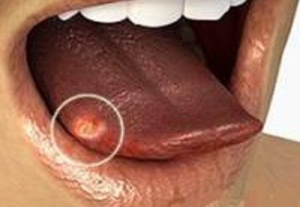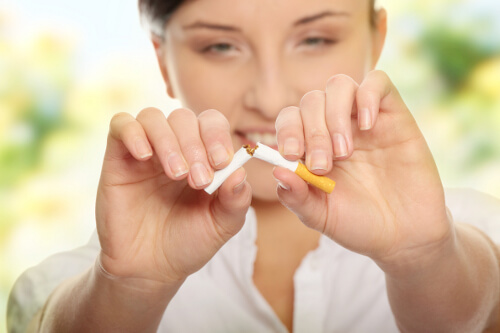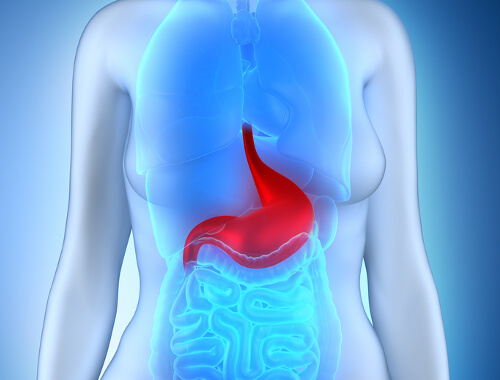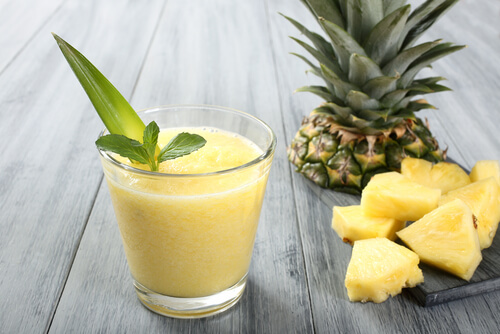A White Tongue: Causes and Solutions


Written and verified by psychologist Valeria Sabater
Generally, having a white tongue is a sign of improper oral hygiene. However, it can also mean there’s some sort of health problem; maybe a digestive or liver issue, among others. Along with a white coloring in your tongue, you may also experience a bitter taste and a pasty feeling in your mouth.
In case you’ve noticed any of these symptoms, pay close attention to them. They could be a sign that you’re not eating correctly or that there’s something wrong with your digestive system. Next, we’ll explain everything you should know about this.
Why is my tongue white?
First of all, you should know that a white tongue doesn’t necessarily indicate a serious condition. However, paying close attention to the symptoms can be really helpful. In most cases, the causes for a white tongue can be fixed easily by eating healthy and having a good oral hygiene.
Usually, the color of your tongue is related to your digestive system, but mostly to your stomach and liver. If you’re also experiencing cold sores or ulcers in your mouth, it may be due to a week immune system. And so it would be necessary to boost your natural defenses. As you can see, a white tongue is no mystery. It’s only effects, results, and problems associated with the need for a better diet. But let’s look at it more closely.
Read also:
1. Oral thrush

It’s also normal that you get small ulcers in your gums, lips and side or top walls of your mouth or even in the back wall of your throat.
2. Lack of oral hygiene
In the same way you brush your teeth, you should scrape your tongue lightly. Your tongue stores bacteria that you must remove. That bacteria can also cause you to have a white tongue along with an unpleasant taste. Remember, one gentle daily brushing and your tongue will look much better.
3. Smoking

4. Gastritis

A white tongue and bad mouth taste are one of the first symptoms of gastritis. But you must also look out for other symptoms.
Does your belly feel swollen? Do you have gas, stomach pain, nausea, diarrhea or a lack of appetite? These are usually other symptoms associated with the inflammation of the lining of your stomach, also known as gastritis.
Note that if these symptoms become much more serious, you should go to your doctor to receive proper treatment. Sometimes it’s simply a mild inflammation that can last two or three days. A white tongue can be an example of a problem in your stomach that you can fix through diet and appropriate guidelines.
5. You need to cleanse your liver
Usually, a white or yellow tongue is almost always due to either a digestive problem, poor oral hygiene, or ultimately, because you need to cleanse your liver. Let’s see what other symptoms you should consider in order to link this problem to a liver issue:
- Decreased appetite with heavy digestion
- Headache
- Pasty mouth with a bitter taste
- Swollen belly
- Gas
- Oily skin with pimples
- Nausea
- Dizziness
- Constipation
- Neck pain
- Cramps and poor circulation
- Muscle fatigue
Remedies to get rid of a white tongue

Usually, whenever you get a bad taste in your mouth or see a white or yellow tongue, you should follow the following tips:
- Eat fermented sugar-free yogurt at least once a day. This keeps the balance of good bacteria both on your tongue and intestines, which also helps to boost your defenses.
- Start the morning with a glass of lemon juice and a half a teaspoon of baking soda. This helps to cleanse your body.
- Try eating raw vegetables in your salads: spinach, tomatoes, lettuce, radishes, peppers cut into small pieces, onions…
- Increase your intake of liquids that are rich in antioxidants. Water and natural juices are great examples; cranberry juice is purifying and takes care of your digestive system. Carrots, beets, and apples also help with this.
- Increase your fruit consumption: oranges, tangerines, and especially pineapples and papayas all have a high dose of vitamin C. They’re easily digested, and help you eliminate toxins from your body.
Remember that when you brush your teeth, you should do the same with your tongue. You can also help yourself with alcohol-based mouthwashes.
All cited sources were thoroughly reviewed by our team to ensure their quality, reliability, currency, and validity. The bibliography of this article was considered reliable and of academic or scientific accuracy.
- Badcock, J. H. (1923). Oral hygiene. British Medical Journal. https://doi.org/10.1136/bmj.2.3271.437-b
- Petersen, P. E. (2008). Oral health. In International Encyclopedia of Public Health. https://doi.org/10.1016/B978-012373960-5.00527-X
- Petersen, P. E., Bourgeois, D., Ogawa, H., Estupinan-Day, S., & Ndiaye, C. (2005). The global burden of oral diseases and risks to oral health. Bulletin of the World Health Organization. https://doi.org//S0042-96862005000900011
- Van Der Weijden, F., & Slot, D. E. (2011). Oral hygiene in the prevention of periodontal diseases: The evidence. Periodontology 2000. https://doi.org/10.1111/j.1600-0757.2009.00337.x
This text is provided for informational purposes only and does not replace consultation with a professional. If in doubt, consult your specialist.








